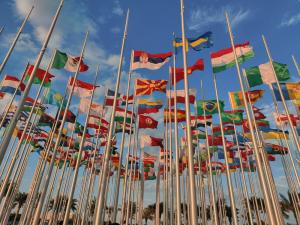
Nationalism can have a few different connotations, some which are positive, and some which are not. It’s the negative ones which have taken over and become uses to represent all forms of nationalism, which is why, when reading documents in the past, we must be careful and not assume the negative kind is involved, especially if the nationalism in question is engaged in the defense and protection of one group of people from another. We can find Christians embracing both kinds of nationalism in their praxis, with some taking the positive forms of nationalism, those which ultimately promote some form of pluralism, while others take on the negative kind of nationalism, the kind which promotes a form of nationalistic supremacy. In modern times, when Christian nationalism is mentioned, it is the negative kind which is meant.
Thus, there are two major forms of nationalism Christians have embraced throughout history. The first kind embraces the plurality of nationalities in the world, looking to promote the unique cultural expressions which emerge from those nationalities, working to bring them together in a harmonious unity in diversity which does not look for ways to promote one as being superior to others. The other engages nationalistic divisions and looks at them in a hierarchical viewpoint, believing some nations and nationalities are superior to others, with one (or a few) deemed as the best and should hold power and authority over the rest.
Plurality, and the differences which plurality represents, does not have to end up being divisive; it can represent a good, as plurality is a way for humanity to represent the divine image, which is itself one (in nature) and plural (in persons). Similarly, as the divine nature infinitely transcends humanity, it can be conventionally expressed in an infinite number of ways, so that every nation, every culture, can be said to demonstrate some quality of the divine nature, with the unity of all these nations helping point to and express the divine nature greater than as it is found in any one particular nation or culture. “Every manifestation of God to man (theophany) bears the imprint of the circumstances in which it was given, especially by the national character of the people who received it.” [1] The plurality of nations, as they emerged in world history, is not necessarily a bad thing, so long as the national distinctions are seen as logical distinctions which do not undermine the unity of humanity; the way we are to do that is to make sure no nation, no culture is viewed as better or superior to others: they are all equal in dignity.
Thus, the positive form of nationalism, one where every nation is seen to have its own inherent worth, and the people within that nation are to be protected from undue subjugation (such as through colonialism or racist ideologies), is something which can be affirmed by Christians. This is especially true if nations come together, look at each other in wonder, and share with each their particular gifts so that they can all benefit from the good which is found in each of them. If one nation, one culture is being oppressed, those from it can and should stand together, promote the good of their culture, and seek not just equality, but equity for what they have experienced. This is what lies behind Gandhi, Badshah Khan, and their resistance to British rule, but it is also what lay behind civil rights protests (Black Theology), and Native American movements in the United States, and this is why, in those circumstances, we will find some of them talking about the good of nationalism: they are talking about the good of protecting and promoting the dignity of their own national culture which is being repressed if not actively being destroyed.
The negative form of nationalism is found when the positive elements of nationalism are distorted and used to promote division in humanity, and through that division, establish that one nation or culture is superior to all others. This leads to the notion of a national or cultural supremacy; when that supremacy is rejected, those who hold it try to act as if their cultural value is being undermined or rejected (abusing the way positive forms of nationalism seek to protect the value of every nation and culture in the world). That is, they will try to use the same arguments as the positive form of nationalism, but seek a different end, one which would not allow others to have the same rights as they do. As Vladimir Solovyov noted, this negative kind of nationalism demonstrates itself in and through egotism, an egotism which reflects in the culture the arrogance and problems which flow from all such egotism:
The more a certain nation is devoted to the universal (supranational) idea, the stronger, the better, the more significant it is itself. Therefore, I am decidedly an enemy of negative nationalism or national egoism, the self-deification of nationality, which in essence is just as disgusting as one’s own self-identification. I take the second command unconditionally: do not make idols for yourselves, neither any likeness, etc. [2]
If left unchecked, this form of nationalism becomes destructive on the world scene, as it begins to believe those coming from it have the right to control the world, and those who do not listen to and obey they, can be and should be punished or destroyed.
Christ’s call for us to love our neighbor as ourselves is true, not only on the personal level, but also on the national and international level. We should look to the world and the plurality of cultures within, and find the good in all of them. This is not to say everything about every culture is good, because, obviously, this is not so. We can and should distinguish the good from the bad, that is, the good contained in every culture from the corruption (and sin) which can be found in all of them. Christians are meant to free that good from the evil and then let it flourish (when they do this, it is often described as “baptizing” the various cultures of the world, where they purify the cultures and help give them the grace they need to perfect their innate goodness and the gifts which they have been given).
When Christians seek to eliminate and destroy all cultural differences, using one cultural norm as universal, they lose sense of the plurality which exists in the world and the good which is found in that plurality. This is what happens when so-called “Christian nationalism” develops. “Christian nationalism” engages the negative form of nationalism (as described by Solovyov); it ends up confusing various aspects of a nation and its culture with Christianity itself, so that if anyone is seen contending against that nationalistic ideology, they are seen as contending against Christianity itself. Such nationalism is not Christian in character, and yet, because it tries to call itself Christian, it tries to use religious liberty as a way to promote itself in the world while denying such liberty to others. Historically, Christian nationalism tends to promote racial superiority, indeed, white supremacy, sometimes denying the humanity of non-whites. Such a form of Christianity must be rejected, indeed, viewed as a heretical; it takes elements of the Christian tradition, various doctrinal and dogmatic statements, in order to view itself as Christian, but it finds its center not in the teaching of Christ and Christ’s call for brotherly and sisterly love, but in promoting the national character they believe is superior, and in doing so, they follow Judas who, as Bulgakov suggested, saw himself as being a follower of Christ while not being able to overcome his own nationalistic ideology:
Into personal love for Him he placed all his nationalistic fanaticism, his ideal, for which he lived. He saw Him in the light of the ideal, of those revolutionary-apocalyptic aspirations, and only in that sense did he took on His work. He did not understand his Teacher, and not only was he not aware of his inability to understand, but he sincerely wanted to change His path, to correct His ideas and actions. [3]
Christianity, therefore, can embrace the form of positive nationalism which promotes pluralism, and with us, unity (or inclusion) in and with diversity, a unity which looks for the good of all and not just some. A way to see this form of nationalism is through an analogy of St. John of Kronstadt who said humanity could be seen as one great tree with many branches: “The human race is one great tree of God, spreading and growing over the whole earth, and covering the whole earth with its branches.”[4] The tree of humanity flourishes and brings beauty into the world by developing various branches or nationalities with distinct character and gifts. The branches are to be respected and protected, and this is done by recognizing how they come together as one (in one humanity). This is important, because Christianity always looks to overcome the divisions created by sin, leading to the way humanity can become and should return to its integral unity in Christ:
For numerous and of almost infinite number are the men, women, and children who are distinct from one another and vastly different by birth and appearance, by nationality and language, by customs and age, by opinions and skills, by manners and habits, by pursuits and studies, and still again by reputation, fortune, characteristics, and connections: All are born into the Church and through it are reborn and recreated in the Spirit. To all in equal measures it gives and bestows one divine form and designation, to be Christ’s and to carry his name. [5]
Christianity teaches the sinful divisions in the world, the kind which separates nations from nations, viewing some as superior to others, is the opposite of what Christ seeks to bring about; the division is the result of sin (represented in the story of the Tower of Babel), and the restoration of humanity is therefore seen as overcoming that sin (which is prefigured at Pentecost). Christians who want to embrace nationalistic plurality and inculturation as a result of it are following the way of Christ, while those who want to keep to the sinful divisions and have nation fight against nation for superiority, subvert and resist the work of Christ. As long as Christian nationalism, and its divisive nature, is treated as Christian, we will find many who call themselves Christians are no longer the salt of the earth, protecting it and the people on it as they should, but rather, a part of the problem, a problem which Christians must acknowledge and overcome so they can then better present Christ’s message of love to the world.
[1] Vladimir Solovyey, God, Man & The Church. The Spiritual Foundations Of Life. Trans. Donald Attwater (Cambridge: James Clarke & Co., 2016), 65.
[2] Vladimir Soloviev, The Karamazov Correspondence. Letters of Vladimir S. Soloviev. Trans. and ed. Vladimir Wozniuk (Boston: Academic Studies Press, 2019), 66[ Letter to Alexander A. Kireev 1883].
[3] Sergius Bulgakov, Judas Iscariot – Apostle – Betrayer. Trans. Mike Whitton (No City Listed: Independently Published, 2023), 22.
[4] St John of Kronstadt, My Life in Christ. Trans. E.E. Goulaeff (London: Cassel and Company, Ltd., 1897; repr. Jordanville, NY: Holy Trinity Monastery, 2000), 86.
[5] St. Maximus the Confessor, “The Church’s Mystagogy” in Maximus the Confessor: Selected Writings. Trans. George C. Berthold (New York: Paulist Press, 1985), 187.
Stay in touch! Like A Little Bit of Nothing on Facebook.
If you liked what you read, please consider sharing it with your friends and family!
N.B.: While I read comments to moderate them, I rarely respond to them. If I don’t respond to your comment directly, don’t assume I am unthankful for it. I appreciate it. But I want readers to feel free to ask questions, and hopefully, dialogue with each other. I have shared what I wanted to say, though some responses will get a brief reply by me, or, if I find it interesting and something I can engage fully, as the foundation for another post. I have had many posts inspired or improved upon thanks to my readers.













